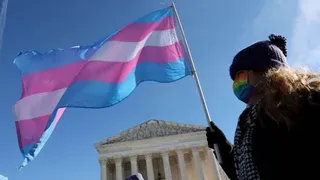March 2, 2008
Advocates, opponents of trans rights bill to have their say on Beacon Hill
Michael Wood READ TIME: 12 MIN.
Brace yourselves. If opponents of transgender rights have their way, the discussion at a March 4 hearing on the transgender rights bill, House Bill 1722, will be derailed in favor of dredging up age-old arguments about who gets to use which bathroom. The landmark hearing will take place before the Joint Committee on the Judiciary and will mark the first time that any committee of the state legislature has heard testimony exclusively related to trans rights. The bathroom argument - essentially, that women will be harassed by men in the ladies room, an argument that was successfully employed to torpedo the Equal Rights Amendment - is an old one.
Already the anti-gay Coalition for Marriage and Family has sent an action alert to its members, warning them of the alleged dangers posed by the bill to bathroom safety. The alert called on supporters to call legislators and parrot that same argument. Meanwhile, on the fringier end of the anti-LGBT movement Amy Contrada of the group MassResistance has been slowly releasing pieces of what she purports to be a 75-page report warning against "the coming nightmare of H.B. 1722." (see"Contrada warns of trans apocalypse.")
But the advocates who drafted the bill and the lawmakers who are pushing for it say the arguments of groups like the Coalition and MassResistance are a red herring, distracting from the bill's true purpose: to extend the state's non-discrimination and hate crimes protections to a population that desperately needs them. In the run-up to the hearing the Massachusetts Transgender Political Coalition (MTPC) and its allies are mobilizing members of the transgender community and their supporters to testify to the discrimination the trans community faces and the impact that passing H.B. 1722 would have on addressing it.
H.B. 1722: The breakdown
Opponents of the bill have accused it of doing some outlandish things. Contrada, for instance, alleges that it would force hotels to host BDSM conferences against their will. But Laura Langley, one of the drafters of the legislation and chair of the Massachusetts Lesbian and Gay Bar Association's committee on transgender inclusion, gave Bay Windows a breakdown on what the language of the bill actually does. H.B. 1722 will add "gender identity and expression" to the state's hate crimes laws. It will also add protections based on gender identity and expression to state non-discrimination laws covering education, employment, housing, credit, and public accommodations. The bill requires the inclusion of "people of diverse gender identities or expressions" on the advisory boards of the Massachusetts Commission Against Discrimination (MCAD), the state's lead civil rights agency. Finally, the bill expands the name and mission of the Massachusetts Commission on Gay and Lesbian Youth to include transgender and bisexual youth.
The legislation defines the terms "gender identity and expression" to mean, "a gender-related identity, appearance, expression, or behavior of an individual, regardless of the individual's assigned sex at birth."
Langley said the bill's language intentionally casts a wide net, covering anyone who may be discriminated against because of either their gender identity or the way they express their gender.
"As with any non-discrimination statute the term that's put in really encompasses everyone. ... By drafting it as gender identity or expression we're including all people, whether their gender identities and expressions are stereotypically gender conforming or gender non-conforming," said Langley.
Jennifer Levi, an attorney for Gay and Lesbian Advocates and Defenders (GLAD) and another of the drafters of the legislation, said the language was designed to ensure that the bill would protect the wide range of members of the transgender community.
"It is intended to protect transsexual people. It is intended to protect transgender individuals who don't take medical steps to align their gender identity with their physical expression of their gender," said Levi.
She said the bill would also protect non-transgender-identified people who do not conform to society's gender norms, including many gay and lesbian people.
"It's not new language. It exists in a number of states that have passed trans-inclusive laws," said Levi. Currently thirteen other states and the District of Columbia have banned discrimination based on gender identity or expression, as have the cities of Boston, Cambridge and Northampton.
According to a report by the National Gay and Lesbian Task Force on transgender-inclusive non-discrimination laws, the scope of those laws varies state by state. Like H.B. 1722, the laws passed in Iowa, Maine, Minnesota, New Jersey, Oregon, Washington and the District of Columbia all include protections around employment, public accommodations, housing, and education. But some of those laws go even further than the proposed Massachusetts legislation. In an interview with Bay Windows last month, MTPC steering committee chair Holly Ryan singled out the New Jersey law as the gold standard of transgender-related legislation, noting that the law contained strong provisions that addressed bullying of transgender students in schools and outlawed the use of the so-called transgender panic defense in criminal trials. "We consider that the best law," said Ryan.
On the other end of the spectrum, many of the states that have passed transgender-inclusive non-discrimination laws have not provided all the protections proposed in H.B. 1722. In Hawaii advocates pressed in 2005 for a non-discrimination bill, but Gov. Linda Lingle vetoed it. In her veto statement Lingle described the bill's definition of gender identity or expression as "objectionable because it contains no limiting terms or interpretational guidelines," and contended it would likely lead to "controversy and unwarranted lawsuits." That bill's definition of gender identity and expression was similar but somewhat broader than the definition in H.B. 1722, encompassing, "a person's actual or perceived gender, as well as a person's gender identity, gender-related self-image, gender-related appearance, or gender-related expression, regardless of whether that gender identity, gender-related self-image, gender-related appearance, or gender-related expression is different from that traditionally associated with the person's sex at birth."
Advocates came back in 2006 and passed a much more limited bill, focused only on public accommodations. The bill passed into law without the governor's signature. And even without the passage of non-discrimination legislation around employment, the state's Civil Rights Commission already interprets the state's prohibition on sex discrimination in the workplace as providing some protection to transgender people. MCAD has issued similar rulings in Massachusetts, but advocates say legislation is needed to ensure clarity and consistency in enforcing non-discrimination protections.
Opponents conjure terror in the toilet
In its January action alert, the Coalition for Marriage and Family, which led the charge against same-sex marriage in Massachusetts in its previous incarnation as VoteOnMarriage.org, claimed that passing H.B. 1722 would threaten the safety of women and children. The alert said the bill "threatens bathroom and locker room safety" by "creating the potential for a wave of access by those claiming to be transgender into gender-specific areas like public bathrooms." The alert urged supporters to contact the legislature and make that same argument.
That same month MFI released a statement explaining its opposition to H.B. 1722 using the same rationale, saying, "Women and children have a right to feel safe in their person when they access public rest rooms, locker rooms and bath houses at parks, recreational areas and other venues. This legislation potentially compromises that safety by, among other things, blurring the distinction of who may enter a 'women's room.'"
Gunner Scott, chair of MTPC, said the claim that H.B. 1722 would put women and children at risk for harm is unfounded.
"Clearly this law is not going to allow anyone to harass someone in a bathroom. If someone harasses someone in a bathroom they still have to face criminal charges," said Scott. He said transgender people themselves often face threats to their safety when using public bathrooms and other facilities and this law is meant to help protect them.
To neutralize the Coalition's argument MTPC has secured support from some high-profile allies. Jane Doe, Inc., the state's coalition of organizations working against sexual assault and domestic violence, and the Massachusetts chapter of the National Organization for Women (NOW) released a joint statement to lawmakers announcing their support for H.B. 1722 and arguing that the legislation poses no danger to women. The statement accuses the Coalition of using scare tactics to try to derail transgender rights legislation. (See "Jane Doe and Mass. NOW tackle the bathroom argument.")
"For [the Coalition] to deliberately create an unfounded fear about women's safety, while simultaneously ignoring the serious threats to safety experienced by many transgender and gender non-conforming people in the Commonwealth, is disgraceful," reads the statement, in part.
Levi said beyond safety the objections by the Coalition also seem to be rooted in the discomfort people may feel sharing bathroom and locker room facilities with transgender people.
"Discomfort has often been the reason why people oppose non-discrimination laws. ... It's never been a justification for not prohibiting discrimination," said Levi.
Langley said that the law would not threaten the establishment of separate bathrooms or locker room facilities for men and women, or the establishment of men-only or women-only gyms. But under H.B. 1722 those facilities would have to open their doors to anyone who identifies as and lives as the gender that they serve. A transgender person who identifies as a particular gender would be entitled to use bathroom, locker room and other single-sex facilities for that gender, regardless of whether or not they have had surgery or are taking hormones.
"It would be an incredible invasion of privacy to say we require that we check people's hormone levels or their genitals before they enter a bathroom," said Langley.
Rep. Carl Sciortino (D-Somerville), one of the bill's two lead sponsors, said in his conversations with other lawmakers they have not been swayed by the bathroom argument, particularly once they learn that the bill will not lessen the criminal penalties for harassment and assault in restrooms.
"Some of our opponents have put out what I would say are red herring issues, and legislators are smarter than that," said Sciortino. "The bill adds to the protection of all citizens and it doesn't protect anyone from engaging in criminal behavior. ... Once we make that point to our colleagues, to other legislators, they understand that, and this really is a red herring issue."
Dressing for success
Beyond concerns about bathrooms, MassResistance's Contrada has also made one of the more common complaints leveled against transgender rights legislation, that it would threaten the right of employers to set dress codes in the workplace and that men will begin coming to work wearing dresses. Levi said that H.B. 1722 does nothing to lessen an employer's right to set dress codes.
"The law doesn't at all allow for workplace anarchy. Ultimately someone who seeks protection under the law has to demonstrate that they have faced adverse treatment because of their gender identity," said Levi.
She said opponents of legislation in other states have made the same "man in a dress" argument, but the track record of other states that have passed similar laws suggests that that argument has little substance.
"Whoever that mythical man is ... [he] hasn't shown up in any of these states nor the District of Columbia that have passed these laws," said Levi. "And if that person showed up dressed in a way that, if somebody was dressing in a particular way just for the purposes of causing problems for their employer that person wouldn't be protected by the law."
But the law would provide protection to transgender people on the job. It would be illegal to fire someone for transitioning. It would also be illegal to fire or refuse to hire someone because the employer discovers that person is transgender. Langley said it would also be illegal to fire someone if an employer discovers that they live as another gender or cross-dress off the job. And the law would protect non-transgender-identified people as well. A woman who feels more comfortable wearing a suit and tie rather than a skirt suit would be permitted to do so.
"The employer would have to allow an individual to dress in a way that most accurately comports with their identity," said Langley.
Scott said people at the hearing would testify about their own experiences of being fired or mistreated on the job because of their gender identity or expression. He said panels will also feature testimony from employees of companies that have voluntarily adopted trans-inclusive non-discrimination policies, and they will explain that those policies helped create a more supportive and stable work environment. Scott declined to name the inclusive companies represented by those planning to testify, saying that all of the people testifying will do so as individuals, not as company spokespeople. But according to Human Rights Campaign's Corporate Equality Index, which rates companies according to their LGBT-related policies, at least 155 Massachusetts companies have gender identity-based non-discrimination policies. Among those companies are Mitt Romney's former consulting firm, Bain & Co., defense contractor Raytheon, office supply giant Staples, and Genzyme, one of the region's leading biotech companies.
A question of civil rights
Despite the focus of groups like the Coalition for Marriage and Family on bathrooms, Levi said at its heart H.B. 1722 is aimed at guaranteeing the civil rights of transgender people in Massachusetts. She said MCAD has ruled that in at least some instances transgender people are protected under the state's gender non-discrimination laws, but the scope of those protections is ambiguous.
"[Even with MCAD's past rulings] there still remains significant confusion about the scope of the law," said Levi. "Having this kind of clarity in all of these areas, including housing and credit and employment, is essential both because it gives notice to the community being protected by the law but also because it gives notice to people who are subject to the law of its breadth."
She said contrary to claims made by Contrada in her report on the legislation, H.B. 1722 does not create any additional restrictions on religious freedom in the state. Levi said all of the religious exemptions for non-discrimination legislation apply equally to H.B. 1722.
Levi also said that the law would not force healthcare providers to cover expenses related to sex reassignment surgery. She said under the bill's public accommodation protections medical facilities that are open to the public would be prohibited from turning away a patient because that person is transgender. But contrary to Contrada's claims, Levi said the bill would not force Catholic hospitals to perform transgender-related surgeries. "If it's specific trans-related coverage, that's not addressed," said Levi.
The Coalition's claims of transgender people attacking women and children in locker rooms and Contrada's worries about hotel BDSM conferences may seem outlandish. But they're par for the course when it comes to debating LGBT issues on Beacon Hill. During the 2004 marriage debates the Coalition and its national partner, Focus on the Family, took out a full-page ad in the Boston Globe claiming that children raised by same-sex couples were at higher risk for physical abuse, health problems, lower school performance, higher criminal behavior and higher sexual experimentation. The fact that many of the studies cited in the ad examined the children of single or divorced parents, not same-sex couples, did not stop the Coalition and Focus on the Family from using the studies to scare lawmakers and the public about same-sex marriage. MassResistance has regularly accused LGBT youth advocates of attempting to recruit teens for sexual purposes.
Arline Isaacson, co-chair of the Mass. Gay and Lesbian Political Caucus, part of the coalition of organizations coordinating the testimony in favor of H.B. 1722, said much of the rhetoric she has heard so far in opposition to H.B. 1722 has echoed the claims made by opponents of the gay civil rights bill during the '80s and by opponents of gay parental rights in the '90s.
"For example, they always said if they passed anti-discrimination laws for the gay community, there'd be constant lawsuits filed, inappropriate lawsuits filed by gay people. We said that was untrue. We've proven to be right," said Isaacson.
In particular Isaacson said opponents claimed gay rights legislation would threaten the right of churches to publicly oppose homosexuality and govern their affairs according to their religious doctrines. In her report on H.B. 1722 MassResistance's Contrada claims that pastors could be charged with hate crimes for preaching in opposition to the transgender movement. But Isaacson said those same arguments proved hollow in debates around gay rights legislation.
"In the '80s and '90s they always claimed that gay people would sue the church. We reminded everyone that there's a separation of church and state that prevents that," said Isaacson. "Time has shown that we were telling the truth and they weren't. There have not been lawsuits."
Rep. Byron Rushing (D-Boston), who is co-sponsoring the bill with Sciortino, said he does not expect opponents to turn out in force at the hearing. He said the fact that the Coalition has focused its statements against H.B. 1722 on issues like abuse of women and children rather than on the central issue of non-discrimination protections suggests that they do not feel comfortable arguing against the transgender community's civil rights.
"One of the things you can see that's come out already, they want to relate this to something else like child abuse, but I think there's a lot of reluctance to just say, we are in favor of discriminating against these people," said Rushing. "When they raise the question of child abuse they open themselves up to, if we can take that off the board, are you okay with this? And they know that, too. So I don't think we're going to see a lot of the vehement discussion [that we had] around the marriage thing. It might change if they see this moving, but I don't think you're going to see it at the hearing."
Sciortino said going into the hearing MTPC and its allies have met with nearly all of the members of the Judiciary Committee or their staffs, and he believes that the debate over H.B. 1722 will in many ways be easier than the marriage debate.
"This is different because it's about basic civil rights, the ability to get a job or live in an apartment or walk down the street without threat of violence. ... That's an easier question, even for some of our more conservative colleagues," said Sciortino.
Michael Wood is a contributor and Editorial Assistant for EDGE Publications.







